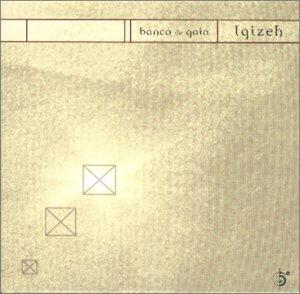 Banco de Gaia - "Iqizeh" (Six Degrees Records 2000, 1034, CD)
Banco de Gaia - "Iqizeh" (Six Degrees Records 2000, 1034, CD)
 Banco de Gaia - "Iqizeh" (Six Degrees Records 2000, 1034, CD)
Banco de Gaia - "Iqizeh" (Six Degrees Records 2000, 1034, CD)
From Aural Innovations #14 (January 2001)
Toby Marks, better known as Banco de Gaia, is one of the premiere electronica artists of our time, yet his appeal extends far beyond electronica. His music is too spacey to be world beat, too exotic to be strictly electronic, too upbeat to be new age, too soft to be rock and roll. It defies categorization, and that's one of the things that makes it so attractive. His latest album, Iqizeh, continues his blend of ancient and modern sounds, this time taking the listener into the heart of Egypt.
An odd thought occurred to me the other day while listening to Iqizeh. It would make a perfect updated soundtrack for the classic Boris Karloff movie, The Mummy. The album is infused with sonic delights that conjure up the mysteries of ancient Egypt, the busy streets of modern Egypt, the decadence of 1930's high society, and the dark and murderous menace of the cadaverous Ardeth Bey. This music doesn't draw on any of the known Middle Eastern clichés heard in almost every soundtrack to movies set in Egypt, but instead delves into something far more primal in feel, yet wholly modern in structure. Coptic voice samples drift in and out of the mix, like snatches of conversation heard while walking down the streets of Cairo. The music draws you along on a trancey stream of electronic rhythms punctuated with dreamy vocals, and exotic instrumentation.
Parts of this album were recorded in the Great Pyrimad at Giza, and the Temple of Seti I at Thebes (not a new idea...artists as diverse as Paul Horn and Nik Turner have done it), but it does seem to have placed Toby Marks in the right frame of mind to create this delicious blend of acoustic and electronic music. The first track, Seti I starts off slowly, an ambient chill, with a slow fade in on an urgent train-like rhythm reminiscent of Marks' earlier classic, Last Train to Lhasa. Obsidian begins with pulsating electronics, and the soft narrations of a female voice, reminding me a little of Antonia Reiner's vocals on Mark Tibenham's GOL project, before it jump-starts into a hyper-dance rhythm, swirling with spacey electronics and sensual voices. This track and Glove Puppet represent Marks' most overt use of vocals (provided by Jennifer Folker, who also gets co-writing credit on Obsidian) to date. This is a dangerous thing for an artist who has previously been known as almost entirely instrumental in nature, and it works, to some extent, better on Obsidian than on Glove Puppet, which occasionally lapses into more standard, sensual pop fare. (Glove Puppet appeared in an instrumental version on Marks' previous album). Crème Egg features a complex, exotic rhythm, with twirls of electronic fire. A sample of droning Middle Eastern vocal song holds the piece together in the middle, giving it an ancient and mysterious feel. Gizeh is the piece I think of when I mention 1930's high society. It starts outside on the dusty streets, with an acoustic sequence that gives way to a plodding yet appealing rhythm, builds slowly, with touches of Middle Eastern sounds swirling around the bass notes. A lazy, late night clarinet plays a jazzy reverie. Beneath it, a big band orchestra swells, almost dream-like in its subtlety. How Much Reality Can You Take? is a slow and dreamy trip down the Nile, with soft, melodic chants buoying the listener like gentle waves. B2 is another dreamy piece, but with more menace to it. Strange voices lie in the murk as the slow rhythm builds, till dark and melancholy waves of cello-like strings enter, taking the listener to an orchestral fade. Fake It Till You Make It is a funkier piece, with gothic organ sounding like a cross between horror movie music and trippy 60's psychedelia, that builds to a powerful chanting crescendo, slipping off into another lazy swirl of cosmic washes of sound. The melody that evolves from this is both exotic and reverent. Sixty Sixteen closes the album with a gentle piece, like curtains blowing in the window, a plucky acoustic sounding melody tinkles gently, then gets slowly drawn along by a hypnotic, electronic sequence reminiscent of early 80's Tangerine Dream.
My only criticism, as it is with most of Toby Mark's works, is the sometimes bizarro titles that he chooses for his pieces, that are not terribly evocative of the music he produces. Nevertheless, forget the titles, close your eyes, and lay back and listen. This music won't take you into the stars, but it will take you to exotic worlds that lie on the fringes of collective unconsciousness.
For more information you can visit the official Banco de Gaia web site, or email them at toby@banco.co.uk.
Iqizeh is distributed by Six Degrees Records. You can visit their web site.
Reviewed by Jeff Fitzgerald